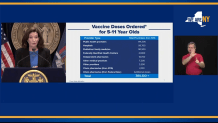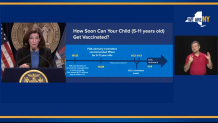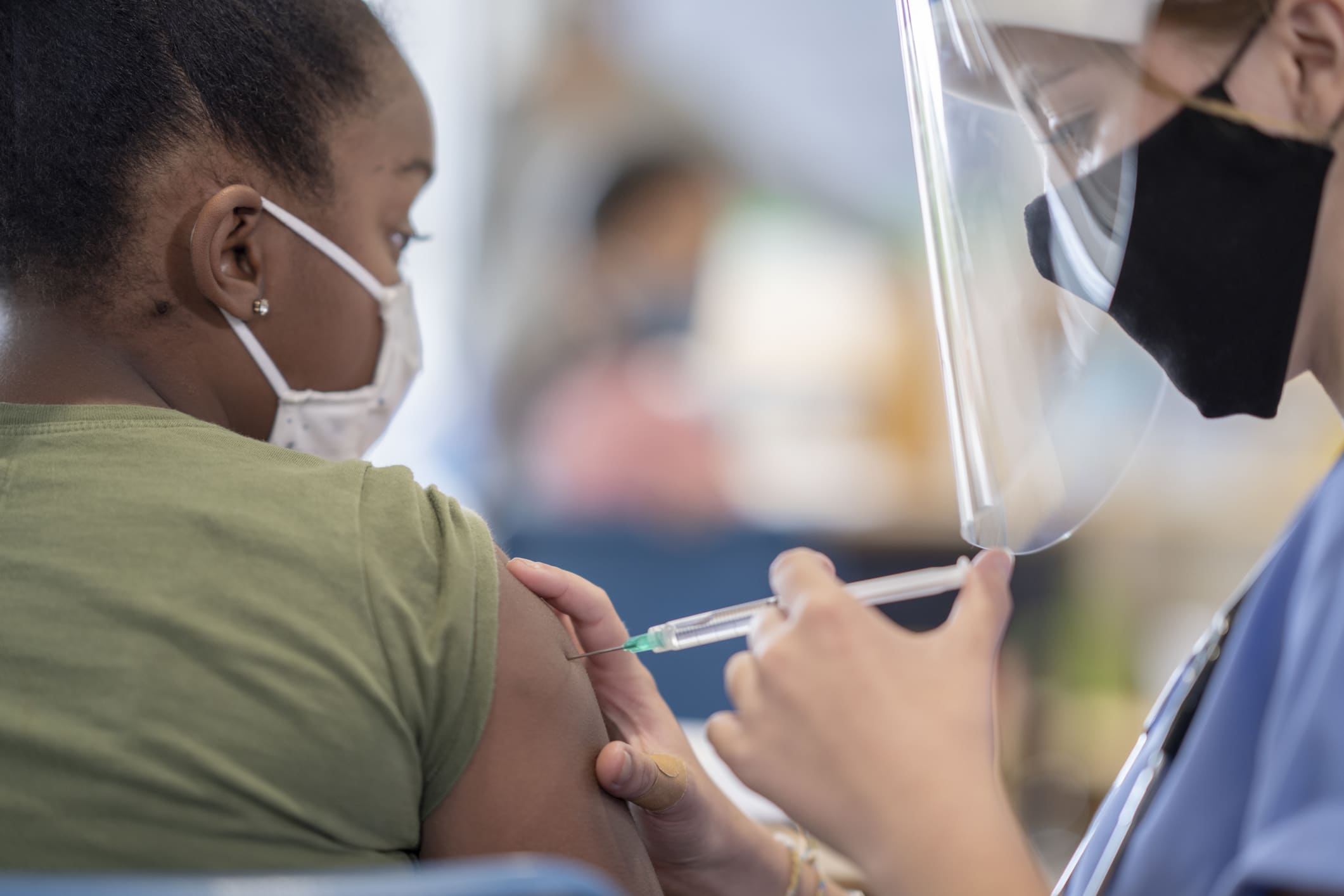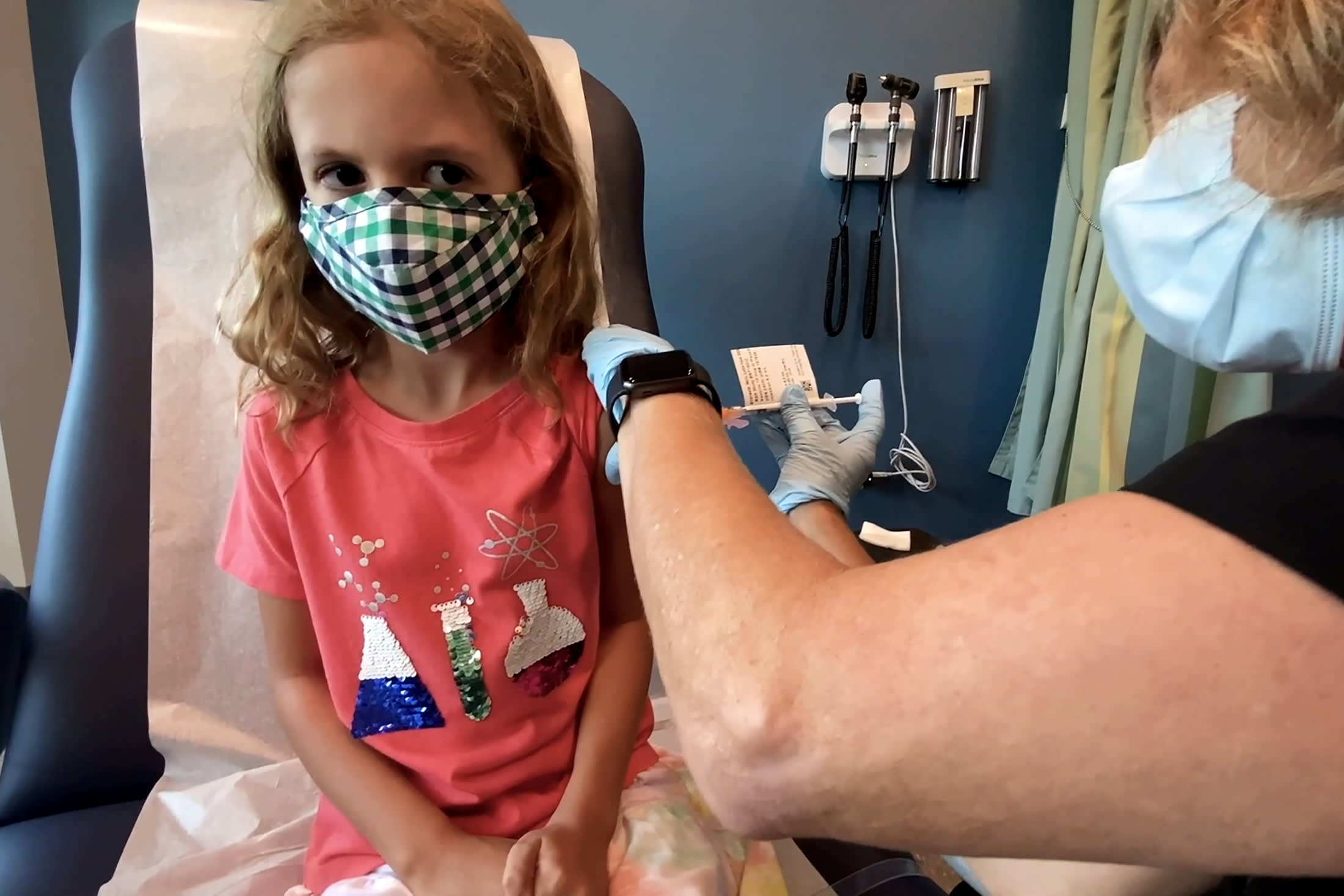New York Gov. Kathy Hochul and her top epidemiologist on Wednesday laid out their most detailed plans yet to deliver hundreds of thousands of COVID-19 vaccine doses to kids aged 5-11 if the feds authorize the shots next week as expected.
The state has pre-ordered more than 380,000 doses of the Pfizer vaccine, the only regimen currently under consideration for emergency use authorization for kids in that age group, in anticipation of the go-ahead -- and to ensure sufficient supply.
That includes more than 231,000 pre-ordered shots for New York City alone -- and covers a variety of providers, from public health facilities to hospitals, pediatric offices, independent pharmacies and other groups ready to handle what Hochul anticipates will be an at least "initial crush" of interest when the green light comes.
"It is imminent. It is happening soon," Hochul said. "All of us remember the frustration of the early days when there were more people eligible than could receive the vaccine. We will not go to that place again."

Hochul encouraged parents and caregivers who have questions about the safety and efficacy of the Pfizer vaccine to solicit answers from their trusted sources now. And she presented one source she says can be trusted, the state's director of epidemiology and a mother of three, with two kids ages 5 to 11, to make the point.
Get Tri-state area news delivered to your inbox.> Sign up for NBC New York's News Headlines newsletter.
That woman is Dr. Emily Lutterloh, and she will head the state's efforts to vaccinate kids in that age group, which includes more than 1.5 million. Hochul said Lutterloh will also spearhead the state's campaign to convince parents to at least have the vaccine discussion with pediatricians and other experts in whom they trust.
"We all want to get back to normal and the fastest way to do that is to start vaccinating this group," said Lutterloh, who has decades of medical research experience and doctorate expertise. "We need pediatricians to talk to parents and encourage those who are eligible to get it ... It makes sense to get it done."
Lutterloh suggested parents take a few steps ahead of next week's federal hearings on the Pfizer vaccine: Ask your pediatrician if the vaccine is available, ask any questions and then make your appointments. She separately encouraged pediatricians to start scheduling those appointments and reach out to the state with questions. Informational webinars will be set up to assist in preparation also.
The governor and top epidemiologist said they want the logistics in place prior to approval. The FDA this week endorsed Pfizer's vaccine on an emergency use basis for kids aged 5-11, a critical first step. Next week, the agency could grant that authorization. Assuming that happens, a CDC panel will meet late next week to discuss recommendations. Its guidance should come the first week of November.

And Hochul is assuring New Yorkers throughout the state she is prepared.
"This really a breakthrough," Hochul said of the expected decision. "This is how we can protect them. We're heading into a time when more kids are indoors, exposed, tired of wearing masks. We know once they get this vaccine they'll be safe."
The Democrat said the state has been in talks with various provider types for weeks now regarding planning, which will involve health centers, pediatric offices, state health partners and school-based programs. Hochul said more than 350 school districts have already indicated they plan to host vaccine events for kids aged 5-11.
"We've asked school districts to tell us how they want to do it," she said. "There are lots of ways to do it."
For now, the governor expects to rely mainly on pediatric offices to carry out the bulk of the vaccinations for kids aged 5-11, given the trust and relationship factor with individual families and their larger communities. She says she could easily scale up mass vaccination sites again, but doesn't expect that demand to be there.
"I think that most parents are going to feel most comfortable in a place where they know the person administering that shot, especially for the younger kids ... so we are going to let the pediatrician offices handle this for now," Hochul said, adding that she does anticipate schools to be a significant part of the equation as well.
More Coverage
Asked whether she expects vaccine mandates to become part of the program for eligible-age students, Hochul echoed sentiments she made since before she was sworn in as governor: "That is a possibility. It is on the table."
"I want to empower parents and the schools to do the right thing first, but if we are not seeing adequate compliance or we start seeing the numbers starting to go up — this is what we are monitoring closely — if I start seeing the infection rate going up, hospitalization rates going up, more children being affected, I will have no choice," Hochul said. "But right now, the numbers are good. Parents will hopefully do the right thing and I will keep an eye out on that situation."
The mandate question has become a topic of consideration for the Fall 2022 school year, Hochul has said, but she reiterated she wouldn't shy away from making a move sooner if needed. She hopes it doesn't come to that. Currently, there are no COVID vaccination mandates for students in New York's public schools.
Mayor Bill de Blasio, whose administration oversees the nation's largest public school district in New York City, has said he opposes such mandates for kids at this point. After the challenges of the last year and a half, he says he wants kids in class.
Earlier this week, de Blasio also laid out the city's plans for delivering COVID-19 vaccines to kids aged 5-11. He said those could begin being administered as early as the first weekend in November, Nov. 5-6, if the federal process goes as expected.
"We may be starting this on a weekend," de Blasio said Tuesday, indicating that Saturday, Nov. 6 or Sunday, Nov. 7, might be when vaccines could start to be administered for children in that age group.
That would allow time for the youngest eligible to be ully protected by Christmas.
The governor also announced 23 new Vax to School sites to increase vaccination rates among children already eligible to get the vaccine. As of Tuesday, nearly 64 percent of 12- to 15-year-olds in the state have received at least one vaccine dose, as have nearly 73 percent of 16- to 25-year-olds.
Over in New Jersey, state Health Commissioner Judith Persichilli said Wednesday that they "will be prepared to vaccinate younger children.'' There are approximately 760,000 children in the 5- to 11-year-old age range in the state, for whom they have preordered 205,000 pediatric doses of the Pfizer vaccine.
Persichilli said that sites will start receiving shipments of the vaccine for children "as soon as the approval is granted." All 21 counties in the state will have sites ready to begin vaccinating children. The state said that 62 percent of 12- to 17-year-olds have received at least one dose so far.
Last week, the FDA review affirmed results from Pfizer showing the two-dose shot was nearly 91% effective at preventing symptomatic infection in young children. Researchers calculated the figure based on 16 COVID-19 cases in youngsters given dummy shots versus three cases among vaccinated children.
There were no severe illnesses reported among any of the youngsters, but the vaccinated ones had much milder symptoms than their unvaccinated counterparts.
Most of the study data was collected in the U.S. during August and September, when the delta variant had become the dominant COVID-19 strain.
The FDA review found no new or unexpected side effects. Those that did occur mostly consisted of sore arms, fever or achiness.
However, FDA scientists noted that the study wasn't large enough to detect extremely rare side effects, including myocarditis, a type of heart inflammation that occasionally occurs after the second dose.
Not sure how the process works? Check out our handy tri-state vaccine site finder and FAQs here
New York City and New Jersey Vaccine Providers
Click on each provider to find more information on scheduling appointments for the COVID-19 Vaccine.
Data: City of New York, State of New Jersey • Nina Lin / NBC



